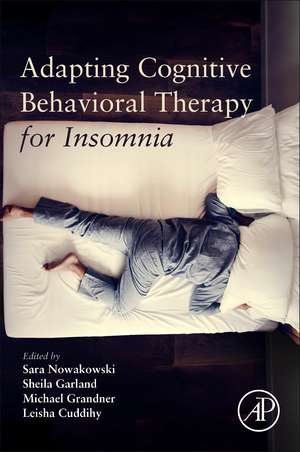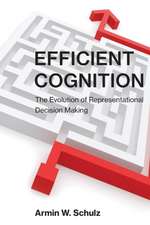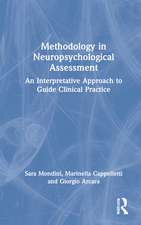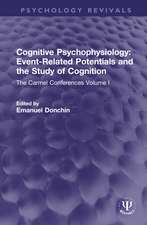Adapting Cognitive Behavioral Therapy for Insomnia
Editat de Sara Nowakowski, Sheila Garland, Michael A. Grandner, Leisha Cuddihyen Limba Engleză Paperback – 12 noi 2021
- Summarizes research on cognitive behavior therapy for insomnia (CBT-I)
- Directs clinicians how to modify CBT-I for comorbid patient conditions
- Discusses comorbid sleep, psychiatric, and medical disorders
- Specifies modifications across the lifespan for different client ages and conditions
- Includes special populations: short sleepers and more
Preț: 690.85 lei
Preț vechi: 1095.31 lei
-37% Nou
Puncte Express: 1036
Preț estimativ în valută:
132.20€ • 138.37$ • 110.03£
132.20€ • 138.37$ • 110.03£
Carte tipărită la comandă
Livrare economică 24 martie-07 aprilie
Preluare comenzi: 021 569.72.76
Specificații
ISBN-13: 9780128228722
ISBN-10: 0128228725
Pagini: 488
Dimensiuni: 152 x 229 mm
Greutate: 0.65 kg
Editura: ELSEVIER SCIENCE
ISBN-10: 0128228725
Pagini: 488
Dimensiuni: 152 x 229 mm
Greutate: 0.65 kg
Editura: ELSEVIER SCIENCE
Cuprins
Preface
Acknowledgments
Part 1: Traditional CBT-I components and delivery
1. Standard cognitive behavioral therapy for insomnia (CBT-I)
Alexandria Muench, Ivan Vargas, Donn Posner, and Michael L. Perlis
Part 2: CBT-I in other sleep disorders
2. CBT-I in patients with obstructive sleep apnea
Earl Charles Crew
3. CBT-I for patients with phase disorders or insomnia with circadian misalignment
Marissa A. Evans and Brant P. Hasler
4. CBT-I for patients with shift work disorder
Philip Cheng
5. CBT-I for patients with hypersomnia disorders
Jason C. Ong and Matthew D. Schuiling
6. CBT-I for patients with orthosomnia
Kelly Glazer Baron
Part 3: CBT-I in psychiatric disorders
7. CBT-I for patients with depression
Jennifer Goldschmied and Philip Gehrman
8. CBT-I for patients with schizophrenia and other psychotic disorders
Andrew Scott Tubbs and Michael A. Grandner
9. CBT-I for people diagnosed with bipolar disorder: Moving from a disorder-focused to a transdiagnostic conceptualization
Allison G. Harvey and Caitlin E. Gasperetti
10. CBT-I in patients with alcohol use and cannabis use disorders
Gabrielle E. Bowyer, Trevor M. Brooks, and Deirdre A. Conroy
Part 4: CBT-I in medical disorders
11. CBT-I for patients with chronic pain
Leisha J. Cuddihy, Sara Nowakowski, Michael A. Grandner, Jessica M. Meers,
and Michael T. Smith
12. CBT-I during and after a cancer diagnosis
Sheila N. Garland
13. CBT-I in patients with a history of traumatic brain injury
Erin A. Almklov, Guadalupe L. Rivera, and Henry Orff
Part 5: CBT-I across the lifespan
14. CBT-I for adolescents
Melisa E. Moore and Alison R. Hartman
15. CBT-I in pregnancy
Anna L. MacKinnon, Ivan D. Sedov, and Lianne M. Tomfohr-Madsen
16. CBT-I for perimenopause and postmenopause
Jessica M. Meers, Darius B. Dawson, and Sara Nowakowski
17. CBT-I for older adults
Jaime M. Hughes and Jennifer L. Martin
Part 6: Other special considerations
18. CBT-I in the short sleep duration phenotype
Julio Fernandez-Mendoza
19. CBT-I for people who failed CBT-I
Michael A. Grandner, Denise Rodriguez Esquivel, and Spencer Dawson
20. CBT-I in patients who wish to reduce use of hypnotic medication
Norah Simpson and Rachel Manber
Acknowledgments
Part 1: Traditional CBT-I components and delivery
1. Standard cognitive behavioral therapy for insomnia (CBT-I)
Alexandria Muench, Ivan Vargas, Donn Posner, and Michael L. Perlis
Part 2: CBT-I in other sleep disorders
2. CBT-I in patients with obstructive sleep apnea
Earl Charles Crew
3. CBT-I for patients with phase disorders or insomnia with circadian misalignment
Marissa A. Evans and Brant P. Hasler
4. CBT-I for patients with shift work disorder
Philip Cheng
5. CBT-I for patients with hypersomnia disorders
Jason C. Ong and Matthew D. Schuiling
6. CBT-I for patients with orthosomnia
Kelly Glazer Baron
Part 3: CBT-I in psychiatric disorders
7. CBT-I for patients with depression
Jennifer Goldschmied and Philip Gehrman
8. CBT-I for patients with schizophrenia and other psychotic disorders
Andrew Scott Tubbs and Michael A. Grandner
9. CBT-I for people diagnosed with bipolar disorder: Moving from a disorder-focused to a transdiagnostic conceptualization
Allison G. Harvey and Caitlin E. Gasperetti
10. CBT-I in patients with alcohol use and cannabis use disorders
Gabrielle E. Bowyer, Trevor M. Brooks, and Deirdre A. Conroy
Part 4: CBT-I in medical disorders
11. CBT-I for patients with chronic pain
Leisha J. Cuddihy, Sara Nowakowski, Michael A. Grandner, Jessica M. Meers,
and Michael T. Smith
12. CBT-I during and after a cancer diagnosis
Sheila N. Garland
13. CBT-I in patients with a history of traumatic brain injury
Erin A. Almklov, Guadalupe L. Rivera, and Henry Orff
Part 5: CBT-I across the lifespan
14. CBT-I for adolescents
Melisa E. Moore and Alison R. Hartman
15. CBT-I in pregnancy
Anna L. MacKinnon, Ivan D. Sedov, and Lianne M. Tomfohr-Madsen
16. CBT-I for perimenopause and postmenopause
Jessica M. Meers, Darius B. Dawson, and Sara Nowakowski
17. CBT-I for older adults
Jaime M. Hughes and Jennifer L. Martin
Part 6: Other special considerations
18. CBT-I in the short sleep duration phenotype
Julio Fernandez-Mendoza
19. CBT-I for people who failed CBT-I
Michael A. Grandner, Denise Rodriguez Esquivel, and Spencer Dawson
20. CBT-I in patients who wish to reduce use of hypnotic medication
Norah Simpson and Rachel Manber
Recenzii
*4 stars* "...discusses the cognitive behavioral therapy (CBT) approach to the treatment of insomnia [and] explores the specific components of CBT and the supporting research,… [including] co-morbid conditions and how to modify the treatment across the lifespan. The book aims to identify how best to deliver CBT based on the needs of patients, recommending modifications based on the patient’s age, co-morbid conditions, as well as various special-case populations…. The book is easy to read and contains numerous tables/figures, which help to clarify the text. This book is excellent. Written by experts in the field, it shows how to apply CBT-I principles to a variety of sleep disorders, including individuals with co-morbid psychiatric and medical disorders. The step-by-step approach makes it easier to learn." --©Doody’s Review Service, 2023, Gary B Kaniuk, PsyD (Cermak Health Services)














